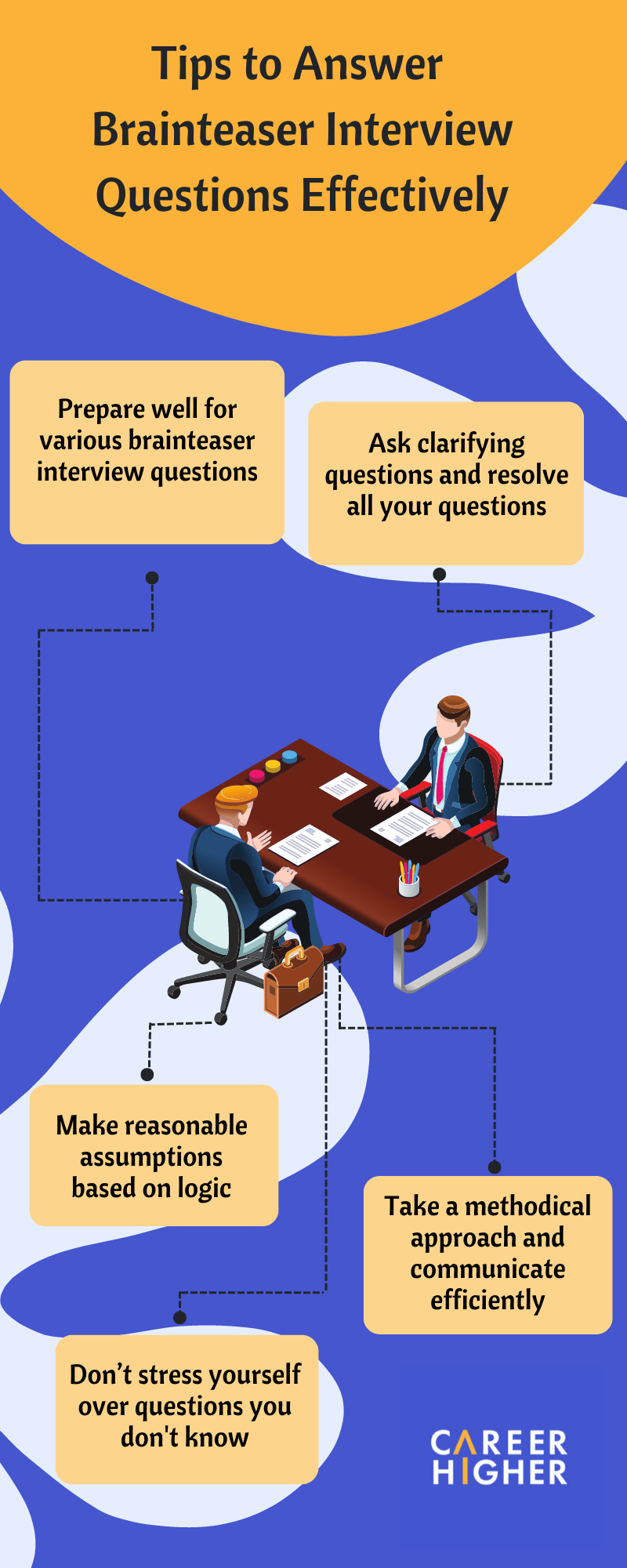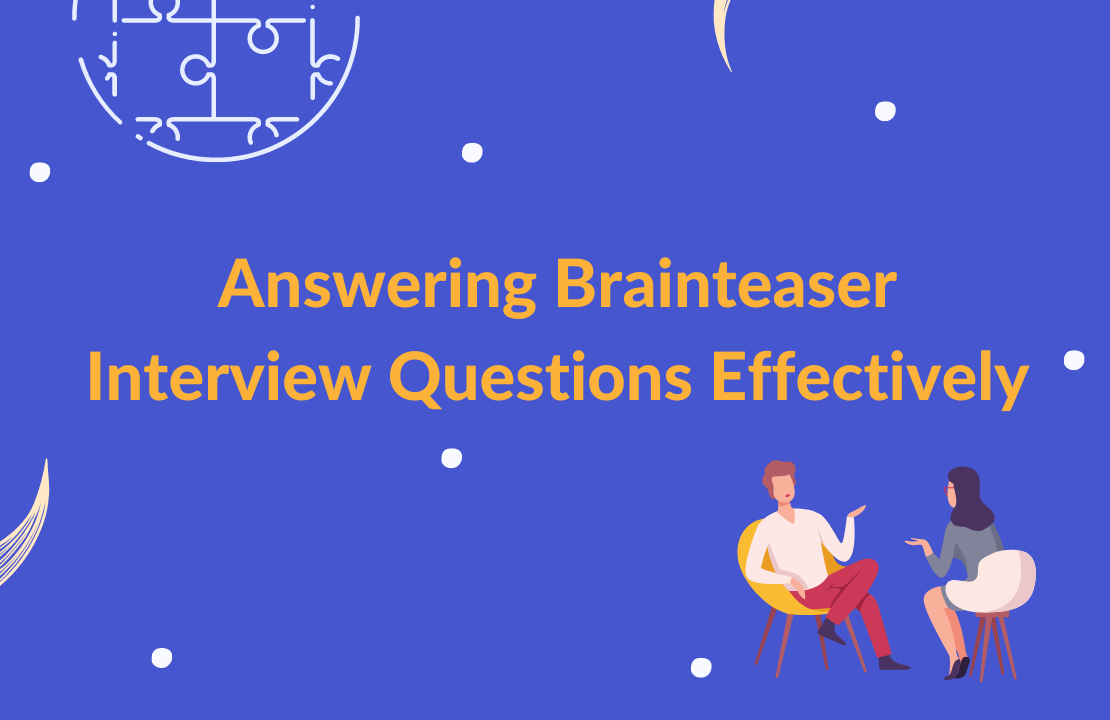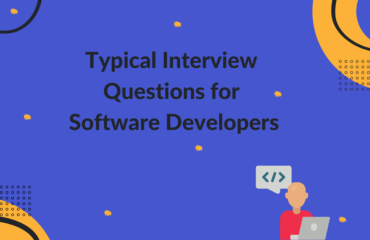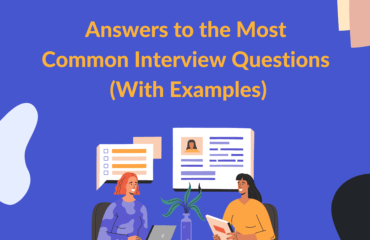Table of Contents
Brainteaser interview questions are puzzle-like questions that aim to assess a candidate’s ability to think logically and handle a difficult situation under pressure. These questions are common in interviews for roles that require complex problem-solving and analytical skills such as management consulting, technology, finance, and engineering. If you’re looking for similar roles, there is a chance you might come across brainteaser interview questions. Hence, understanding what they are and how to approach them is essential. Below are some interview preparation tips to help you nail your performance.
Brainteaser interview questions have recently gone out of favor. Nonetheless, well-known companies like Apple, Facebook, Microsoft, Gold Sachs, and IBM are known for having utilized these types of questions at some point or another to find the best talent. Asking such questions helps interviewers gain a deeper understanding of the candidate’s thinking process and critical abilities, including the following.
- Problem-solving – Ability to quickly analyze the problem and come up with a solution
- Critical thinking – Ability to see the big picture, think logically, and weigh options
- Analytical Skills – Ability to analyze, calculate, and use data to determine possible outcomes
- Creativity and out-of-the-box thinking – Ability to take an innovative approach to solve a problem
- Stress Management Skills – Ability to perform well in high-pressure situations
There are various types of brainteaser questions. Understanding what they are can be helpful in structuring your responses and rocking your performance. Here are some of the brainteaser types and examples you can expect in an interview.
- Illusion Brainteasers – These questions deceive you into making wrong conclusions by directing your attention to misleading details.
E.g., “Tracy’s mother has four children. One child is named April. The second one is May. The third is June. What is the fourth child’s name?”
- Draw-Explanation Brainteasers – These questions present you with strange and seemingly impossible scenarios and then ask you to explain them.
E.g., “A mother and her daughter entered a restaurant. When a guy passed by, both women said, “Hello, Father.” How is this possible?”
- Wording Brainteasers – These questions use contradictory words to create unexplainable scenarios, which can create confusion.
E.g., “What has four legs but only one foot?”
- Pattern Brainteasers – These questions give data that follow specific patterns and ask you to fill in the blanks.
E.g., “What is the next number in the following sequence: 125, 64, 27, 8?”
- Logical Brainteasers – Unlike other brainteasers, these questions do not involve tricks or illusions. As the name suggests, answering these require a logical approach.
E.g., “What day comes after the day before yesterday if Sunday is two days away?”
- Letter-trick Brainteasers – These questions use organization, composition, and visual presentation of letters to demonstrate the meaning of a word or phrase.
E.g., “What does “CCCCCCC” mean?”
Many of the common brainteasers do not have right or wrong answers. Even if this is the case, there are tips and tricks you need to keep in mind so you can provide an appropriate response. Let us take a look at some of them below.
Brainteasers may include unusual or abstract questions that are irrelevant to the job. Your task is to formulate a suitable answer based on logic, analysis, and hypothesis. It is easy to become confused by these types of questions if you have come unprepared. Hence, familiarizing yourself with different types of brainteaser questions during your interview preparation stage is imperative. Although you may not get the same exact questions, it will give you an idea of the type of questions to expect and how to answer them.
To further your preparation, we also recommend finding a partner to practice with, such as a career strategist, mentor, colleague, friend, or family member. This will help you become more comfortable answering brainteaser questions in an interview-like scenario. As a result, you will feel more confident, enabling you to perform at your best during the actual interview.
b) Ask clarifying questions
Brainteaser interview questions can be challenging. Solving them requires a creative, out-of-the-box thought process. So before answering, it is important to ensure you have a complete grasp of what is being asked. Resist the urge to blurt out the first thing that comes to your mind.
Instead, take the time to think about the question and plan in your head how you will structure your response. If there is anything unclear, ask clarifying questions. It would also help to use a pen and paper to take down notes and ensure you do not miss crucial pieces of information.
c) Make reasonable assumptions
In most cases, brainteaser questions have multiple possible solutions. So, rather than getting caught up in the search for the single correct answer, analyze the question and make a reasonable assumption based on logic. Based on the data you have gathered, try to find and fill the gap in the argument. However, your task does not end there. Brainteaser interview questions are not about finding an accurate and correct answer. It is more about your thinking process. Hence, being able to clearly justify your assumptions is imperative to impress the interviewers.
d) Communicate your thinking process
When it comes to brainteaser questions, your thought process is more important than the actual answer. Hence, thinking aloud as you work your way through a conclusion is essential. Take a methodical approach to your response and verbalize the steps you are taking to solve the brainteaser question. As a rule of thumb, the focus of your response should be on your thinking process rather than the final answer. Explaining how you came up with an answer will help demonstrate your ability to solve complex problems and think logically.
e) Don’t stress yourself too much on questions you don’t know
Brainteaser questions can be challenging to solve. This can cause stress and loss of focus, which may negatively impact your performance during the interview. Hence, managing stress and maintaining your calm and confidence in such a situation is a must. If you find the question too challenging for you, ask the interviewer if you can come back to the question at a later time. If you are not able to answer the question, it may be best to let it go. In most cases, being truthful about your ability to answer an interview question is more essential than providing a heedless response.

Although brainteaser interview questions are less common today, some companies still use them. Thus, it can still be helpful to include them in your interview preparation checklist. Keep in mind that brainteasers are more about understanding your thought process. So, it is important to focus on honing your ability to think under pressure and logically work through the problem. If you need help preparing for an interview, you can always reach out to us.











